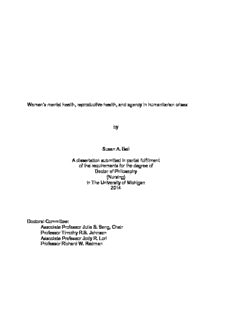
Women's mental health, reproductive health, and agency in humanitarian crises by Susan A. Bell A ... PDF
Preview Women's mental health, reproductive health, and agency in humanitarian crises by Susan A. Bell A ...
Women’s mental health, reproductive health, and agency in humanitarian crises by Susan A. Bell A dissertation submitted in partial fulfillment of the requirements for the degree of Doctor of Philosophy (Nursing) in The University of Michigan 2014 Doctoral Committee: Associate Professor Julia S. Seng, Chair Professor Timothy R.B. Johnson Associate Professor Jody R. Lori Professor Richard W. Redman © Susan A. Bell 2014 DEDICATION This dissertation is dedicated to my one-person support team for the past twenty years. Thank you for always having the highest of expectations for me and also for the many sacrifices you have made so that we can both follow our dreams. Also to my girls, Madison, Megan, and Meredith (M3). My family is my reason for being. Thank you for supporting me unconditionally. ii ACKNOWLEDGMENTS I would like to thank the School of Nursing and Rackham Graduate School for providing support to make this dissertation research possible. I am humbled to represent both schools through support from a Rackham Merit Fellowship as well as an NIH T32 pre-doctoral fellowship. I am also grateful to Global REACH, African Studies Center and the Institute for Research on Women and Gender for conference and small grant funding. I am extremely fortunate to have such a supportive dissertation committee who has put up with me in good times and bad. I often describe my committee by saying that I won the mentor jackpot. This is undoubtably true, as I cannot imagine a more encouraging group of world-renowned scholars who are also patient and kind. I am forever grateful to you all. Thank you very much to Stacy DeJesus of the Centers for Disease Control for consistent advice, and for connecting me with numerous people along the way. Thanks to Katie Anfison, formerly of the American Refugee Committee and now of Population Services International for providing me with this dataset and others as I sought to answer my research questions. Thank you to the Seng Lab Group. Two hours per week to present my research, get feedback and be with my tribe was essential to keeping me on track. Thank you to Michelle Munro, Meghan Eagen-Torkko and others who have iii provided an enormous amount of input, support and guidance. I am grateful to the women who participated in this survey. I hope they will someday benefit from this research, and will know the gift they have given me in return. iv TABLE OF CONTENTS DEDICATION ii ACKNOWLEDGMENTS iii LIST OF FIGURES vi LIST OF TABLES vii LIST OF ABBREVIATIONS ix ABSTRACT xi INTRODUCTION 1 CHAPTER 1. Women’s Mental Health, Reproductive Health and Agency in 6 Humanitarian Crises: Literature and Theoretical Support 2. Psychometric Validation and Comparison of the SRQ-20 75 and SRQ-SIB among Congolese Refugee Women 3. Understanding the Effects of Mental Health on Reproductive 107 Health Post-Crisis: A Mixed Methods Approach 4. Development of a Brief Screening Tool for Mental Health 147 Assessment in Refugee Settings 5. Closing and Summary 178 v LIST OF FIGURES FIGURE 1.1 Conceptual Model of Trauma Informed Disaster System Response 53 2.1 Dose response relationship of the SRQ-SIB with mean scores on SRQ-SIB with SIB items removed 99 4.1 Dose response relationship of the SRQ-SIB with mean scores on SRQ-SIB with SIB items removed 170 vi LIST OF TABLES TABLE 1.1 Simplified Evidence Table 54 1.2 Carper's Four Ways of Knowing Applied to this Research 57 1.3 Selected Stakeholders 58 1.4 Current Standards for Health Care in Emergency Situations (selected) 59 1.5 Table of Evidence 60 2.1 SRQ-SIB 88 2.2 Sample Characteristics of Sample 90 2.3 Comparison of SRQ-20 and SRQ-SIB 91 2.4 Item Total Statistics 92 2.5 Mean Comparison between Women who Experienced Forced Sex during 93 Conflict and Those Who Did Not on SRQ-SIB and SRQ-20 2.6 Comparison of SRQ-SIB and SRQ-20 in MPlus 94 2.7 Oblique Rotated Loadings for the SRQ-SIB and SRQ- 20 95 2.8 SRQ-SIB Three Factor Model 97 2.9 Logistic Regression of SRQ-20 and SRQ-SIB Total Scores and Subscales 98 as Predictors of Being in the Group of Women who Experienced Forced Sex during the Conflict 3.1 SRQ-SIB 130 3.2 Operationalization of Reproductive Health Service Use Variables 132 vii 3.3 Explanation of Participants Included in Each Analysis 133 3.4 Sample Characteristics 134 3.5 SRQ-SIB Results by Total Sample and By Camp 136 3.6 Logistic Regression Models for the Four Main Outcomes with the Mental Health Scale entered as a Whole and with Three Subscales 138 4.1 SRQ-SIB 164 4.2 Comparison of Demographic and Trauma Exposure Profiles by Training and Testing Samples 166 4.3 Descriptive Information About the 22 items in Training Versus Testing Samples and for the Total Sample 167 4.4 Cross-Validation Results of Two-Item and Four-Item Screening Tools 168 4.5 SRQ-5 Screening Tool with Single Item Suicide Screener 169 viii LIST OF ABBREVIATIONS AIDS- acquired immunodeficiency syndrome ANOVA- Analysis of variance ARC- American Refugee Committee CDC- Centers for Disease Control CMD- Common mental health disorders DMAT- Disaster Medical Assistance Team DSM-IV – Diagnostic and Statistical Manual of Mental Disorders, Fourth Edition HC- Humanitarian Crisis HIV- Human Immunodeficiency Virus IDP- Internally displaced person IASC-Inter-Agency Standing Committee IAWG- Inter-agency Working Group MISP- Minimum Initial Service Package for Reproductive Health mhGAP-Mental Health Gap Action Project MGD- Millennium development goal PRIME-Program for Improving Mental Health Care PTSD- Posttraumatic Stress Disorder RAISE -Reproductive Health Access, Information, and Services in Emergencies SD- Standard deviation ix
Description: